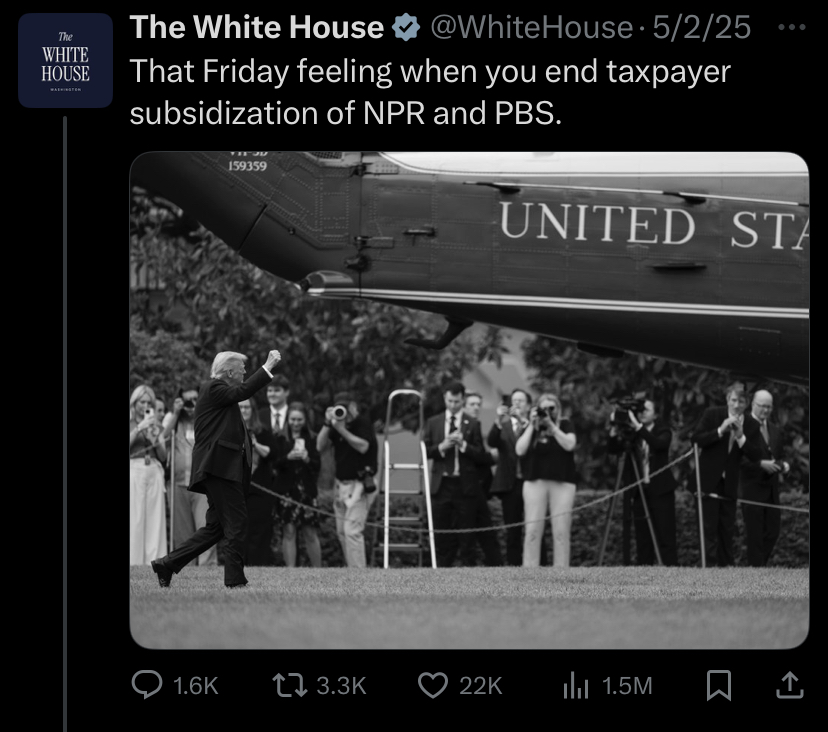Within the first five months of his second term, President Donald Trump has signed and discussed executive orders affecting immigrants, habeas corpus and defunding of certain news outlets, raising concern that his power has extended from executive to borderline authoritarian.
Executive orders are passed by the president, they have force of law. They may be used to implement and enforce existing laws, manage the executive branch, and direct federal agencies. Trump’s executive orders sparked discussion regarding if he is giving himself more power with the executive orders signed.
Though previous presidents have signed executive orders, the amount and process Trump is undergoing is beginning to alarm people due to the misconduct and issues with the constitution.
US history and Advanced Placement (AP) human geography teacher Paul Gordon believes that the amount of executive orders signed is alarming, but sees the commonality between presidents who have done it before.
“I think I want to say he’s skipping the line, but like, Barack Obama did it, Joe Biden did it before him, and I think all presidents are going to do it,” Gordon said.
According to an article by the Columbia Broadcasting System (CBS), an American commercial broadcast television and radio network, “President Trump has set a historic record during the first 100 days of his second term, signing far more executive orders than any other president in U.S. history over the same period.”
In a news poll by CBS, “64% of Americans think Mr. Trump is trying to increase presidential power — including 84% of Democrats.”
Due to various groups suing Donald Trump, such as immigration right activists, labor unions, Non-profit and advocacy groups, the cases have reached the Supreme Court. Trump challenged the Supreme Court by criticizing court rulings that were against him, though the lawsuits display a clear indication of public disapproval, Trump continues to push out orders.
everal executive orders have been blocked by the Supreme court. According to American media company U.S News, Trump’s proposed executive orders that would end birthright citizenship, suspend refugee programs, shut down international broadcasting network Voice of America, and block federal funding for “sanctuary” cities.
On May 1, Trump filed an executive order to end federal funding for The Public Broadcasting Service (PBS), an American public broadcaster and National Public Radio (NPR), an American public broadcasting organization. The White House announced on X that the reason behind this is due to PBS and NPR being biased “left-wing” news sources.
“…receive millions from taxpayers to spread radical, woke propaganda disguised as ‘news,’” according to PBS.
Though The White House labeled these news outlets as propaganda in an article “Ending Taxpayer Subsidization of Biased Media”, Gordon perceived them to be unbiased news sources.
“I think NPR and PBS are immensely important. They are not for profit companies, and their whole job is to disseminate non partisan, non biased news,” Gordon said.
Though the news outlets still have the right to produce articles, the ending of federal funding complicates the possibility of publishing due to being a major support source
Political scientists believe that the government is shifting into an authoritarian-like system, a political system that uses strong central power. According to NPR article “Hundreds of scholars say U.S. is swiftly heading toward authoritarianism” more than 500 US political scientists think that the United States is “moving swiftly from liberal democracy toward some form of authoritarianism.” A liberal democracy is a political system that emphasizes freedom, equality and rights for every individual.
Similar to political experts,freshman Kourtney Nguyen expressed that with her new knowledge of what she learned in her world history class, she sees similarities between previous authoritarian leaders and Trump.
“I think he kind of is like Hitler since I’m learning about World War Two and stuff, I just like, I’m seeing the similarities between, like, the concentration camps and like CECOT and stuff. Like, it’s just crazy,” Nguyen said.
Centro de Confinamiento del Terrorismo (CECOT), the Terrorism Confinement Center, is a maximum security prison in Tecoluca, El Salvador. Nguyen sees a resemblance between CECOT and the concentration camps due to the inhumane conditions they both maintain.

Director of the America’s Division of Human Rights Watch Juanita Goebertus Estrada published a statement concerning prison conditions in El Salvador for the J.G.G v. Donald J. Trump case, a class action and habeas corpus lawsuit by five Venezuelan men who were placed in immigration custody.
Habeas Corpus is a legal principle that inalienably allows people to have the right to appear before a judge and request for their release on their detention. It was threatened with impending removal under the proclamation of President Trump invoking the Alien Enemies Act of 1798.
Estrada wrote about a prisoner who was moved to a punishment cell where “the new cell was constantly dark, detainees had to sleep standing due to overcrowding, and there was no regular access to drinking water.”
Not only is space and access to drinking water an issue, Estrada also wrote that
“Doctors who visited detention sites told us that tuberculosis, fungal infections, scabies, severe malnutrition and chronic digestive issues were common.”
On March 13 and 14, President Trump and El Salvador’s President Nayib Bukele came to an agreement on the housing of illegal immigrants. According to AP News, “the Trump administration will pay the government of President Nayib Bukele $6 million for one year of services.”
Despite the agreements they came to, worries about human rights issues have been increasing.
Though this is only one of many concerns regarding the Trump Administration, According to the Cable News Network (CNN), plenty of immigrants have filed habeas corpus petitions to slow down the deportation process. Though President Trump hasn’t directly stated anything regarding habeas corpus, CNN reports that White House Deputy Chief of Staff Stephen Miller said that the Trump Administration was actively looking into suspending habeas corpus.
Despite President Trump’s efforts, Article I, Section 9, Clause 2 of The Constitution states “The Privilege of the Writ of Habeas Corpus shall not be suspended, unless in Cases of Rebellion or Invasion the public Safety may require it.”
However, unlikely the suspension of Habeas Corpus may be, along with the other executive orders signed, a clear threat to democracy.








